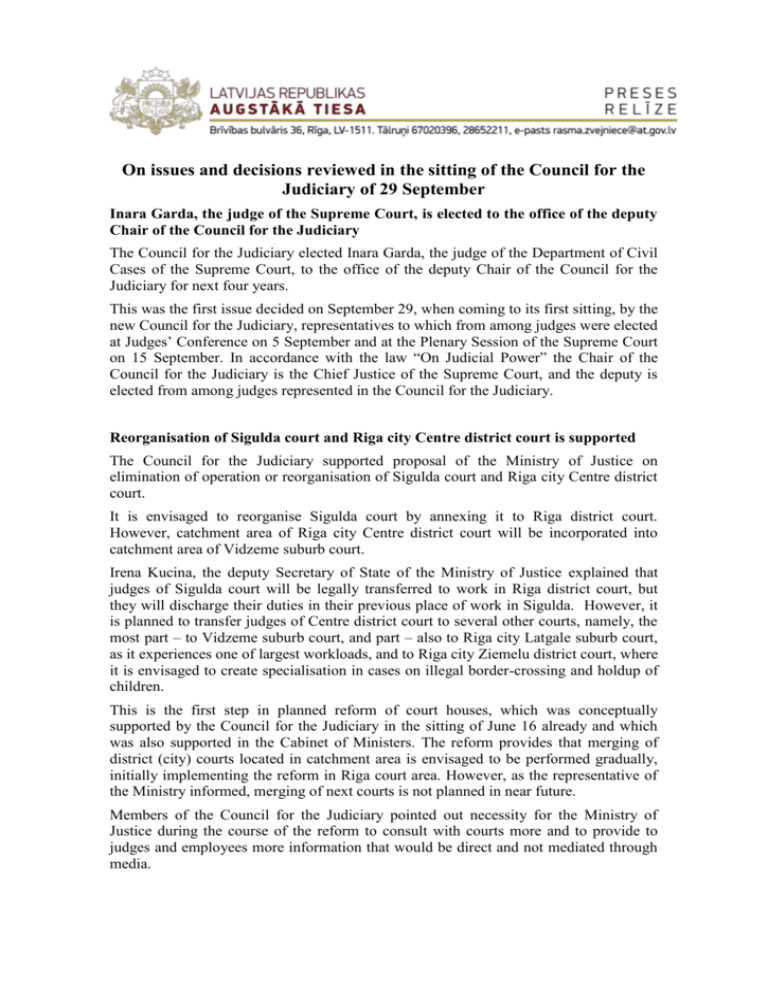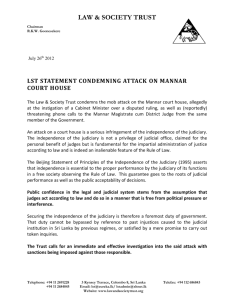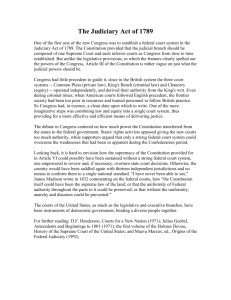Par TP 29.09.
advertisement

On issues and decisions reviewed in the sitting of the Council for the Judiciary of 29 September Inara Garda, the judge of the Supreme Court, is elected to the office of the deputy Chair of the Council for the Judiciary The Council for the Judiciary elected Inara Garda, the judge of the Department of Civil Cases of the Supreme Court, to the office of the deputy Chair of the Council for the Judiciary for next four years. This was the first issue decided on September 29, when coming to its first sitting, by the new Council for the Judiciary, representatives to which from among judges were elected at Judges’ Conference on 5 September and at the Plenary Session of the Supreme Court on 15 September. In accordance with the law “On Judicial Power” the Chair of the Council for the Judiciary is the Chief Justice of the Supreme Court, and the deputy is elected from among judges represented in the Council for the Judiciary. Reorganisation of Sigulda court and Riga city Centre district court is supported The Council for the Judiciary supported proposal of the Ministry of Justice on elimination of operation or reorganisation of Sigulda court and Riga city Centre district court. It is envisaged to reorganise Sigulda court by annexing it to Riga district court. However, catchment area of Riga city Centre district court will be incorporated into catchment area of Vidzeme suburb court. Irena Kucina, the deputy Secretary of State of the Ministry of Justice explained that judges of Sigulda court will be legally transferred to work in Riga district court, but they will discharge their duties in their previous place of work in Sigulda. However, it is planned to transfer judges of Centre district court to several other courts, namely, the most part – to Vidzeme suburb court, and part – also to Riga city Latgale suburb court, as it experiences one of largest workloads, and to Riga city Ziemelu district court, where it is envisaged to create specialisation in cases on illegal border-crossing and holdup of children. This is the first step in planned reform of court houses, which was conceptually supported by the Council for the Judiciary in the sitting of June 16 already and which was also supported in the Cabinet of Ministers. The reform provides that merging of district (city) courts located in catchment area is envisaged to be performed gradually, initially implementing the reform in Riga court area. However, as the representative of the Ministry informed, merging of next courts is not planned in near future. Members of the Council for the Judiciary pointed out necessity for the Ministry of Justice during the course of the reform to consult with courts more and to provide to judges and employees more information that would be direct and not mediated through media. Research of case-law in application of claim collateral will be performed Observing issue updated by the Legal Affairs Committee of the Saeima (Parliament) on case-law in application of claim collateral and high interest and often critical attitude of media and society towards procedure of review of such cases in courts and results thereof, the Council for the Judiciary supported initiative of the Supreme Court to perform case-law compilation and identifying of problematic issues in application of claim collateral. To emphasize significance of research, the Supreme Court will use authority of general meeting of judges of the department of the Supreme Court established in Section 49.1 of the law “On Judicial Power” to discuss topical issues on interpretation of legal norms and formulate its opinion as a decision. New court policy initiatives are supported The Council for the Judiciary supported new policy initiatives of the Supreme Court and new policy initiatives of regional courts, district (city) courts and Land Registry offices prepared by the Ministry of Justice, or measures that require additional financing from state budget. The Supreme Court requests financing in budget for 2015 for establishment of the Division of Scientific Research in the Supreme Court, installation of qualitative and secure record system for recording of court hearings in accordance with requirements of the Civil Procedure Law, repair of premises of the Chamber of Criminal Cases due to structural reform in the Supreme Court, and to ensure competitive salary to employees of the Supreme Court, increasing wages for 8 per cent. However, financing is requested in new policy initiatives of regional courts, district (city) courts and Land Registry offices prepared by the Ministry of Justice is requested for distribution of competences among court instances to ensure support personnel for offices of judges in regional courts, which shall be established after liquidation of the Chamber of Criminal Cases, for ensuring of competitive remuneration to court employees, increasing average salary for 8%, and to judges’ assistants – in addition to extension of their authority, as well as for increase of amount of trainings for judges and court employees. Extra funds have been requested also for development of security infrastructure in courts, maintenance of court houses, extension of premises of Kurzeme regional court and new premises for Riga city Zemgale suburb court. Additional financing has been requested also to increase wages of judges and prosecutors for 8 per cent. Strategic guidelines on communication of a court system shall be elaborated Continuing elaboration of court communication guidelines commenced by the previous Council for the Judiciary in cooperation with the Judicial Ethics Commission, the Council for the Judiciary heard opinion of communication expert and accepted a proposal to elaborate strategic guidelines on communication common for all court system, It was agreed to delegate representatives of the Judicial Ethics Commission, the Ministry of Justice, the Court Administration and the Supreme Court to a work group that will work together with an expert representing the Council for the Judiciary. Elaboration of common guidelines on transfer of cases to another court is supported The Council for the Judiciary considered elaboration of guidelines common for all courts on how to organise transfer of cases accepted for proceedings to another court as useful. To equalize workload of courts, Section 32.1 of the Civil Procedure Law envisages an opportunity in period prior to the end of reform of so called clear court instances to transfer cases, examination of which on the merits has not been commenced yet, to other courts of the same or another court area. Experience, which was accumulated since legal norm has been effective, purports that uniform procedure of application of legal norm and organisation of this process is necessary. Observing practice and opinions of courts, guidelines will be prepared by the Ministry of Justice and approved – in accordance with authority stipulated by the law – by the Council for the Judiciary. Work group of the ministry will search for solution to ensure security in court rooms In relation to the judgement of the European Court of Human Rights in case of Calovskis, containing reproaches expressed to Latvia for placement of detainees in metal enclosure in a court room, the question of how to ensure security in court rooms not using these metal enclosures was updated. Discussion on this question was raised also at the sitting of the Council for the Judiciary. The Ministry of Justice will establish work group, which will search for solution of a problem. Judges, representative to the Cabinet of Ministers before international human rights organisations will be invited to participate in work of the work group, as well as representatives of the Ministry of Interior, as ensuring of security in court rooms is the task of this ministry. Two judges are chosen from among four candidates for the Administrative regional court The Council for the Judiciary had to decide, whom two from among four judges of the Administrative district court, who had applied in the competition, to transfer to vacant offices of judges in the Administrative regional court. The Judicial Qualification Committee considered them all to be equally appropriate candidates. Taking into account previous work experience and opinion of the Administrative regional court, the Council for the Judiciary decided on transfer of Laura Konosonoka and Lauma Paeglkalna. The Council for the Judiciary also reviewed other issues related to judicial careers – on transfer of Ina Baiko, the judge of Riga city Vidzeme suburb court, to Daugavpils court upon her request and participation in internal competition to a vacant office of a judge, and on determination of a court for execution of duties to judges newly appointed by the Saeima (Parliament). Inga Lipska will be a judge in Riga district court, and Ligita Sprigule – in Tukums district court. Information prepared by Rasma Zvejniece, the Head of the Division of Communication of the Supreme Court E-mail: rasma.zvejniece@at.gov.lv, telephone: 67020396, 28652211









